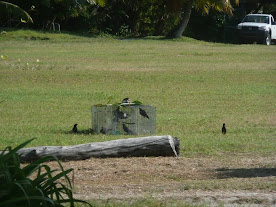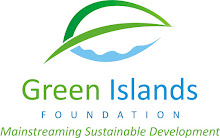In the Seychelles context Artisanal Shark Fishermen (ASF) are loosely
defined as artisanal fishermen who actively target shark and generate
approximately 30% or more of their annual income from that fishery.
The use of shark nets was banned in 1998 (Prohibition of net fishing of sharks Reg. 16c 1st August 1998) due to concern regarding by-catch of turtles, marine mammals and non-target whale sharks. Following this the method known locally as “drag” – an anchored long line up to 400 metres in length with anything from 40-120 baited hooks on drop lines – has been developed and utilised in the fishery.
The ASF operate out of small open boats with outboard engines and their range is in general restricted to within 15 miles of their home anchorage. Each boat is typically able to set up to four drag per trip. The fishermen utilise their specialised knowledge of the Seychelles plateau, often passed down within family units, and set their lines in the evening to drift over prime areas and catch the shark as they mobilize in the evening and night time. The lines are retrieved in early morning. The method is largely non-selective, though variations in depth of hook, bait and habitat fished can be utilised to target certain species.
The fishery is typified by the diverse and full use of shark products for the local market. Fresh shark meat is sold each day at the fish market, the meat is also salted and sundried for sale. The especially thick skin of the head of the shark and for some species the entire skin is often flayed and salted for separate sale as a local delicacy “lapo latet reken”. The stomachs are likewise sometimes salted for use, whilst the teeth, spines and jaws of some species are used to make jewelry or for sale as trophies. The fins are of course cut and dried for export to the Asian market.
What is important to note is that this constitutes a wise use of the resource – landing and using the whole animal – as opposed to the wasteful and unsustainable practice of simply fining sharks and discarding the carcass at sea. Furthermore this fishery supplies an important source of cheap, quality protein to the local population. The economic difficulties that Seychelles has passed through over the last 2 years have underlined its importance as local demand for shark meat has increased considerably due to its value-for-money pricing relative to many other fish species.
The GIF project is still in the process of identifying all the ASF on the three main islands and attempting to bring them together so that they can cooperate to better manage their fishery and also properly defend their rights to their traditional livelihood. The site visit to Praslin early this month (2nd to 4th July) was successful with 5 ASF identified there and interviewed. The next step is to bring the ASF together so that they can identify and discuss their common concerns and deliberate on how they can best cooperate.
It is important that all ASF are identified because the National Plan of Action for sharks will seek at some point to license the fishery and close it to newcomers as part of the process of improving management of shark stocks on the plateau – a complete listing is therefore required to protect the rights of these fishers to accessing their means of livelihood(Contributed By John Nevill).
The use of shark nets was banned in 1998 (Prohibition of net fishing of sharks Reg. 16c 1st August 1998) due to concern regarding by-catch of turtles, marine mammals and non-target whale sharks. Following this the method known locally as “drag” – an anchored long line up to 400 metres in length with anything from 40-120 baited hooks on drop lines – has been developed and utilised in the fishery.
The ASF operate out of small open boats with outboard engines and their range is in general restricted to within 15 miles of their home anchorage. Each boat is typically able to set up to four drag per trip. The fishermen utilise their specialised knowledge of the Seychelles plateau, often passed down within family units, and set their lines in the evening to drift over prime areas and catch the shark as they mobilize in the evening and night time. The lines are retrieved in early morning. The method is largely non-selective, though variations in depth of hook, bait and habitat fished can be utilised to target certain species.
The fishery is typified by the diverse and full use of shark products for the local market. Fresh shark meat is sold each day at the fish market, the meat is also salted and sundried for sale. The especially thick skin of the head of the shark and for some species the entire skin is often flayed and salted for separate sale as a local delicacy “lapo latet reken”. The stomachs are likewise sometimes salted for use, whilst the teeth, spines and jaws of some species are used to make jewelry or for sale as trophies. The fins are of course cut and dried for export to the Asian market.
What is important to note is that this constitutes a wise use of the resource – landing and using the whole animal – as opposed to the wasteful and unsustainable practice of simply fining sharks and discarding the carcass at sea. Furthermore this fishery supplies an important source of cheap, quality protein to the local population. The economic difficulties that Seychelles has passed through over the last 2 years have underlined its importance as local demand for shark meat has increased considerably due to its value-for-money pricing relative to many other fish species.
The GIF project is still in the process of identifying all the ASF on the three main islands and attempting to bring them together so that they can cooperate to better manage their fishery and also properly defend their rights to their traditional livelihood. The site visit to Praslin early this month (2nd to 4th July) was successful with 5 ASF identified there and interviewed. The next step is to bring the ASF together so that they can identify and discuss their common concerns and deliberate on how they can best cooperate.
It is important that all ASF are identified because the National Plan of Action for sharks will seek at some point to license the fishery and close it to newcomers as part of the process of improving management of shark stocks on the plateau – a complete listing is therefore required to protect the rights of these fishers to accessing their means of livelihood(Contributed By John Nevill).

























No comments:
Post a Comment